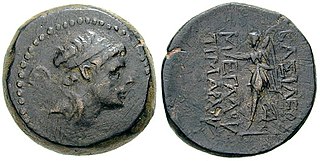Ammonius Saccas was a Greek philosopher from Alexandria who was often referred to as one of the founders of Neoplatonism. He is mainly known as the teacher of Plotinus, whom he taught for eleven years from 232 to 243. He was undoubtedly the biggest influence on Plotinus in his development of Neoplatonism, although little is known about his own philosophical views. Later Christian writers stated that Ammonius was a Christian, but it is now generally assumed that there was a different Ammonius of Alexandria who wrote biblical texts.

Abellio was a god worshipped in the Garonne Valley in Gallia Aquitania, known primarily by a number of inscriptions which were discovered in Comminges. He may have been a god of apple trees.
Heraclides, Heracleides or Herakleides in origin was any individual of the legendary clan of the Heracleidae, the mythological patronymic applying to persons descended from Hercules. As they were of the legendary tribe of the Dorians, the name in the classical age could mean anyone of Dorian background. The Dorians had their own group of dialects, which may or may not have been spoken by given individuals. Usage of the name was concentrated at Syracuse, a Dorian colony, Tarentum, a Spartan colony, and central Greece, legendary ancestral homeland of the Dorians, but they colonized the islands, Crete, and Anatolia as well. As a personal name, Heraclides may refer to:
Phaenias of Eresus was a Greek philosopher from Lesbos, important as an immediate follower of and commentator on Aristotle. He came to Athens about 332 BCE, and joined his compatriot, Theophrastus, in the Peripatetic school. His writings on logic and science appear to have been commentaries or supplements to the works of Aristotle and Theophrastus. He also wrote extensively on history. None of his works have survived.

Timarchus or Timarch was a usurper in the Seleucid empire between 163–160 BC.
Ammonius of Athens, sometimes called Ammonius the Peripatetic, was a philosopher who taught in Athens in the 1st century AD.
Adrianus was a Greek poet who wrote an epic poem on the history of Alexander the Great, which was called the Alexandriad (Αλεξανδριάς). We chiefly know of this poem from a mention of the seventh book in the Suda, but we possess only a fragment consisting of one line. The Suda mentions, among other poems, a work by a poet "Arrianus" called Alexandriad or Αλεξανδριάς, and there can be no doubt that this is the work of Adrianus, which is mistakenly attributed to this "Arrianus".
Boethus of Sidon was a Peripatetic philosopher from Sidon, who lived towards the end of the 1st century BC.
Origen the Neoplatonist was a Platonist philosopher who lived in Alexandria. He was a student of Ammonius Saccas and a contemporary of Plotinus in Ammonius's philosophy school in Alexandria. It is possible that he was the famous Christian philosopher and theologian Origen of Alexandria, who was educated by Ammonius Saccas..
Apollonius of Athens—sometimes Apollonius of Naucratis—was a Greek sophist and rhetorician who lived in the time of the Roman emperor Septimius Severus, that is, the end of the 2nd century.
Papyrus Oxyrhynchus 252 is a fragment of a notice of removal, in Greek. It was discovered in Oxyrhynchus. The manuscript was written on papyrus in the form of a sheet. It is dated to the year 19-20. Current location of fragment is unknown.
Papyrus Oxyrhynchus 297 is a fragment of a Letter concerning a Property Return, in Greek. It was discovered in Oxyrhynchus. The manuscript was written on papyrus in the form of a sheet. It was written at 23 July 54. Currently it is housed in the library of the Columbia University in New York City.
Apollonides of Nicaea lived in the time of the Roman emperor Tiberius, to whom he dedicated a commentary on the Silloi of Timon of Phlius.
Heracleides of Smyrna was physician, mentioned by Diogenes Laërtius as one of the followers of Hicesius, the head of the Erasistratean school of medicine at Smyrna, who must therefore probably have lived in the first century BCE.
Heracleides of Sinope was a writer of ancient Greece. Under this name we possess a Greek epigram in the Greek Anthology. It is not improbable that two other epigrams are likewise his productions, though his native place is not mentioned there. He seems to have been a poet of some celebrity, as Diogenes Laërtius mentions him as ἐπιγραμμάτων ποιητὴς λιγυρός. Diogenes Laërtius mentions fourteen persons of this name.
Heracleides was a rhetorician from Lycia, who lived and taught in Athens and Smyrna in the second century.
Heracleides of Magnesia, is known only as the author of a history of Mithridates VI of Pontus (Μιθριδατικά), which is lost.
Heracleides of Odessus, in Thrace, was an ancient Greek historian mentioned by Stephanus of Byzantium.
Heracleides was one of the three ambassadors sent by the Seleucid ruler Antiochus IV Epiphanes to Rome to support his claims on Coele-Syria against Ptolemy VI Philometor, and defend his conduct in waging war upon him, 169 BCE.
Archelaus was a geographer of ancient Greece who wrote a work in which he described all the countries which Alexander the Great had traversed.




